According to a notice on the Aeroplan website that was posted on May 14, 2019, three class action lawsuits have been authorized in the province of Quebec, targeting Aeroplan’s practice of levying fuel surcharges, airport improvement fees, and passenger service charges when redeeming flight rewards using Aeroplan miles.
The first class action lawsuit relates to fuel surcharges on Air Canada-operated flights within North America, with the designated group of class members described as follows:
All consumers domiciled and residing in Quebec who, since December 12, 2011, redeemed Aeroplan Miles, through the Aeroplan Program owned and/or operated by Aimia Canada Inc. and Aimia Inc., to purchase airline tickets for domestic or US transborder flights operated by Air Canada, Air Canada Rouge or Air Canada Express and who paid a fuel surcharge for such flights.
The second lawsuit pertains to airport improvement fees across 20 Canadian airports, with the class members described as follows:
All consumers domiciled and residing in Quebec who, since December 15, 2011, redeemed Aeroplan Miles, through the Aeroplan Program owned and/or operated by Aimia Canada Inc. and Aimia Inc., to purchase flight tickets and who paid, with respect to such flights, airport improvement fees, and applicable taxes, imposed by the airport authorities operating the following airports:
Prince George, BC, Vancouver, BC, Victoria, BC, Calgary, AB, Edmonton, AB, Regina, SK, Saskatoon, SK, Winnipeg, MB, London, ON, Ottawa, ON, Toronto, ON, Montreal Dorval, QC, Quebec, QC, Fredericton, NB, Moncton, NB, Saint John, NB, Halifax, NS, Charlottetown, PEI, Gander, NL, St. John’s, NL.
The third lawsuit focuses on passenger service charges at a number of foreign airports on Air Canada-operated flights, with the class members described as follows:
All consumers domiciled and residing in Québec who, since June 9, 2012, redeemed Aeroplan Miles, through the Aeroplan Program owned and/or operated by Aimia Canada Inc. and Aimia Inc., to purchase Air Canada flight tickets and who paid, with respect to such flights, Passenger Charges, and applicable taxes, as a result of departing from or transiting through the following airports (collectively the ‘Foreign Airports’):
the Heathrow airport in London, UK;
the Charles de Gaulle airport in Paris, France;
the Lyon airport in Lyon, France;
the Frankfurt airport in Frankfurt, Germany;
the Munich airport in Munich, Germany;
the Copenhagen airport in Copenhagen, Denmark;
the Narita airport in Tokyo, Japan;
the Haneda airport in Tokyo, Japan.
What Are These Fees?
Unless you have elite status with Air Canada, fuel surcharges are levied on all domestic and transborder Air Canada flights to the tune of about $42 one-way or $84 round-trip.
Of course, it’s the fuel surcharges on international flights that are the most egregious, sometimes reaching upwards of $500 per flight, but those aren’t being considered under this class action lawsuit.
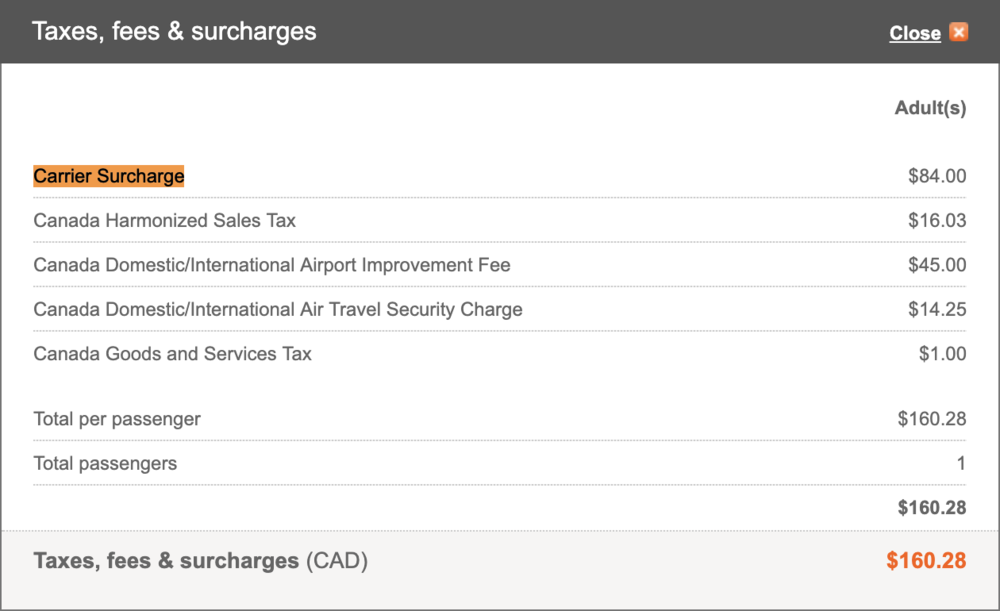
Any departure from one of the above-listed airports incurs an airport improvement fee of about $40. Layovers of over four hours in duration also incur an airport improvement fee at the connection point.
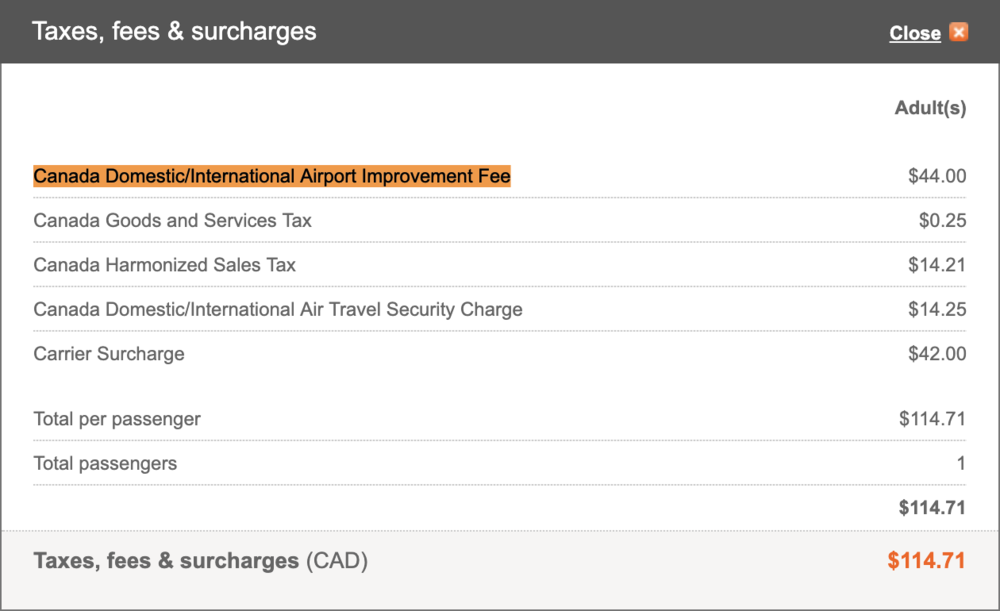
Lastly, many airports around the world levy a passenger service charge for departing flights. Note that although the class action lawsuit lists London Heathrow Airport as one of the airports in question, the passenger charge doesn’t include the exorbitant UK Air Passenger Duty, but rather a separate UK Passenger Service Charge that’s also pretty expensive in itself.
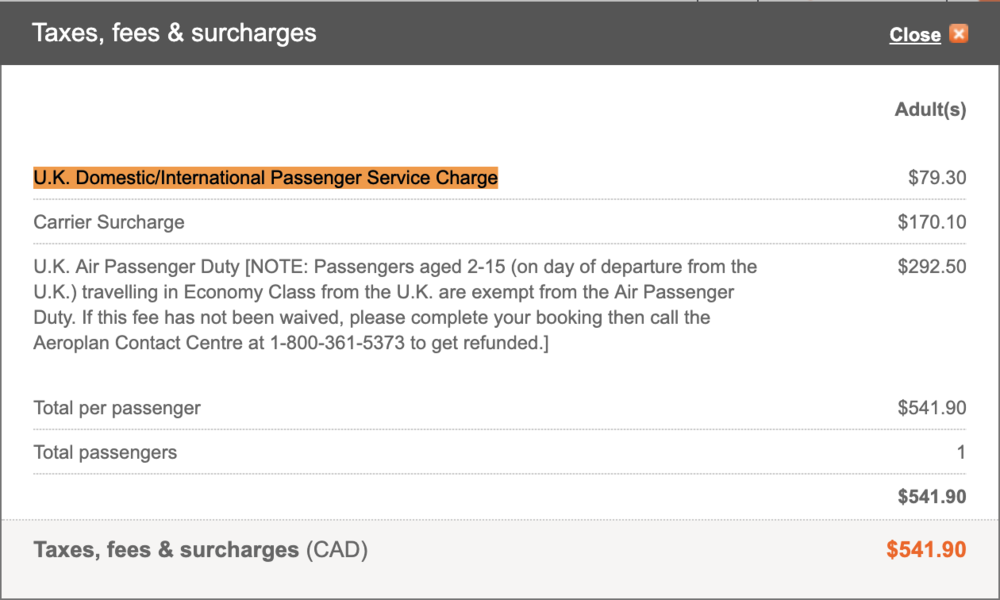
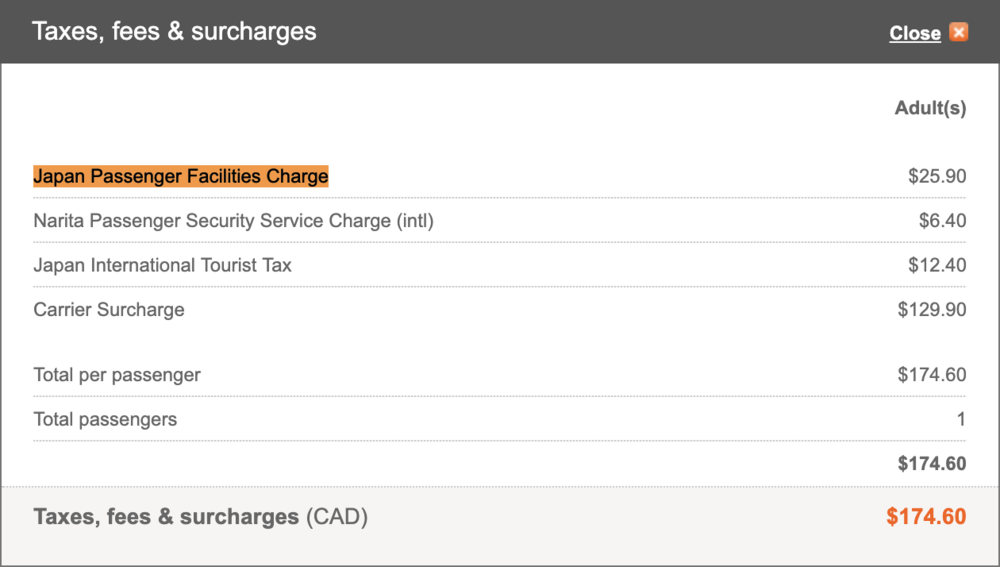
Are You Part of the Class Action?
If you live in Quebec and have redeemed Aeroplan miles in the past 7–8 years, you can look over your confirmation emails to see if you were charged any of these fees. You’ll want to study the “Fare calculation” section under the Tax and Fee Summary, and look out for the following letter combinations in particular:
-
YQ/YR: Fuel surcharge
-
SQ: Airport improvement fees
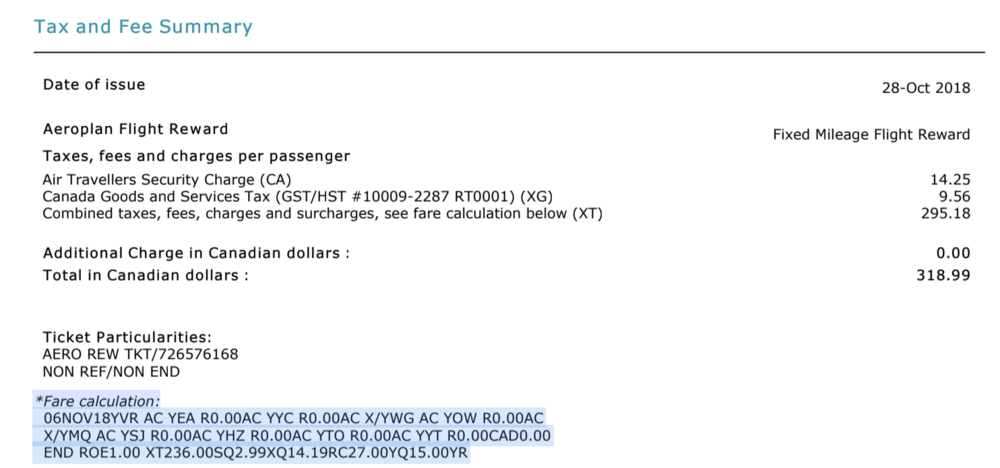
In the example above, the fare calculation displays “236.00SQ” and “27.00YQ15.00YR”, meaning that I’ve paid $236 in airport improvement fees and $27 + $15 = $42 in fuel surcharges on this ticket (in case you’re wondering, this was my Canadian Hopper redemption that hit up 10 Canadian airports in a single one-way booking).
The foreign passenger service charge is trickier to locate, since its code varies from country to country. The easiest way to figure out the two-letter code for a certain airport is to pull up a dummy booking using ITA Matrix.
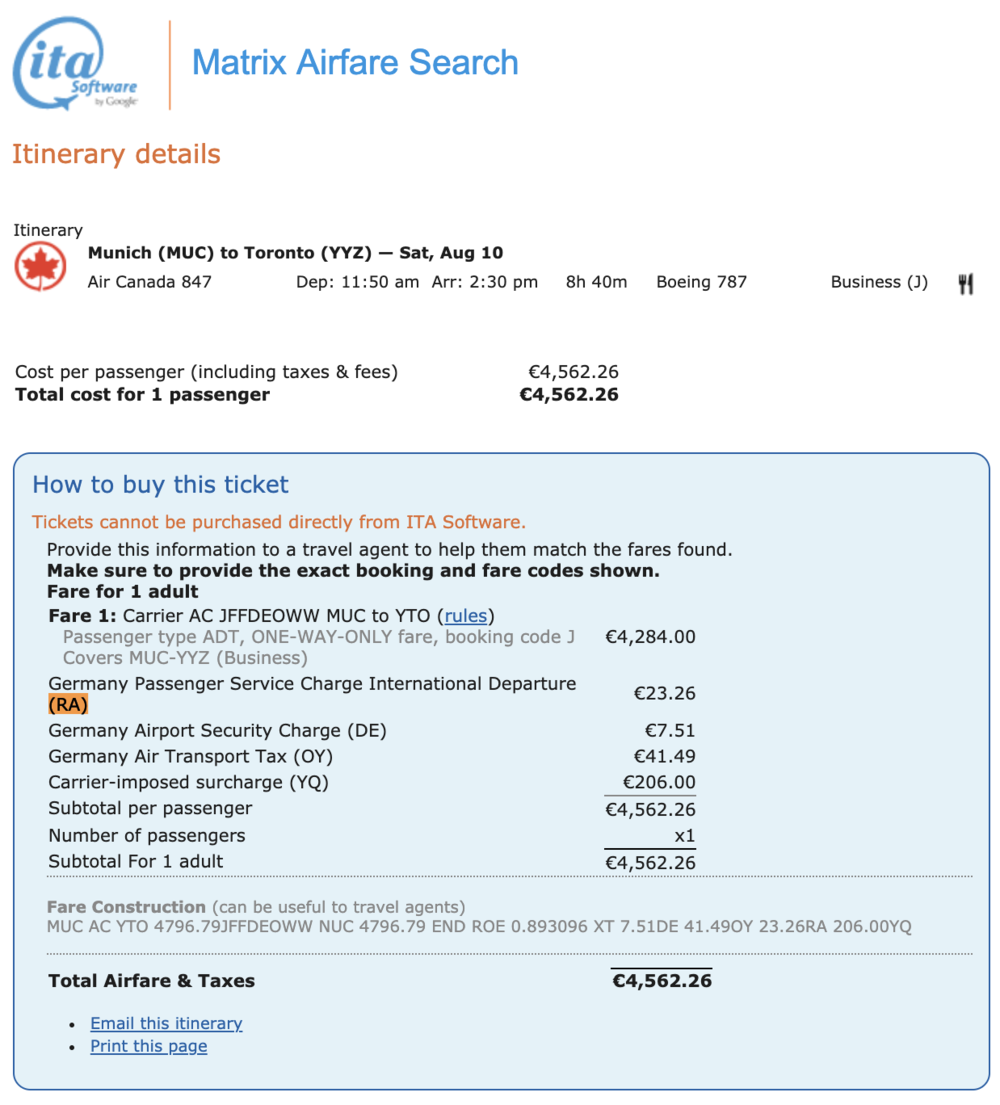
For example, using a dummy booking departing out of Munich Airport (MUC), we see that the two-letter code for the Germany Passenger Service Charge is “RA” – you can then cross-reference this code against your Aeroplan confirmation emails to see if you were ever charged it.
The first two class action lawsuits (for fuel surcharges and airport improvement fees) encompass Quebec residents who have redeemed Aeroplan miles for travel since December 15, 2011. The third lawsuit (for passenger service charges) applies to members who have redeemed miles since June 9, 2012.
In all three cases, if you live in Quebec and were charged one of the above fees on an Aeroplan booking you made in the designated time period, you’ll be automatically enrolled in the class action with no further steps required on your part. However, you’re free to contact the group lawyers free of charge to obtain more information about the lawsuit and learn about your rights.
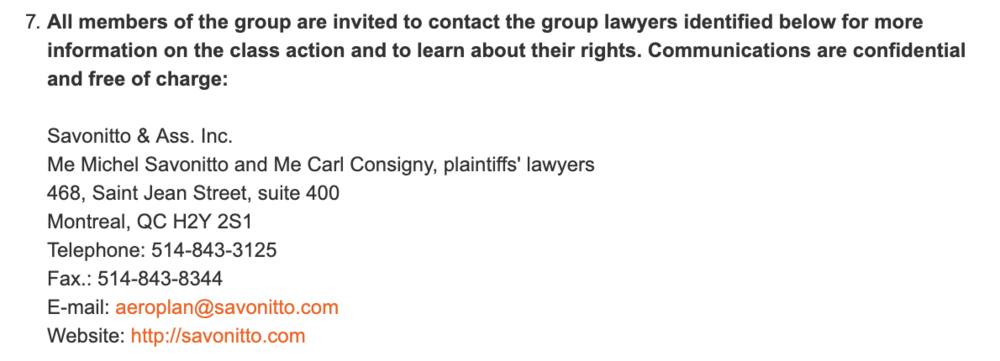
What Does the Class Action Call For?
According to the notice, the main questions being considered in the class action relate to whether the fuel surcharges, airport improvement fees, and passenger service charges were “charged illegally and contrary to the Aeroplan Terms and Conditions”.
If so, the class action is asking for Aeroplan to reimburse members the full amount of the fees in question, plus $100 per person in punitive damages for each case (so Quebec-based Aeroplan members who paid all three types of surcharges in the designated time period would be entitled to a full refund plus $300 in punitive damages).
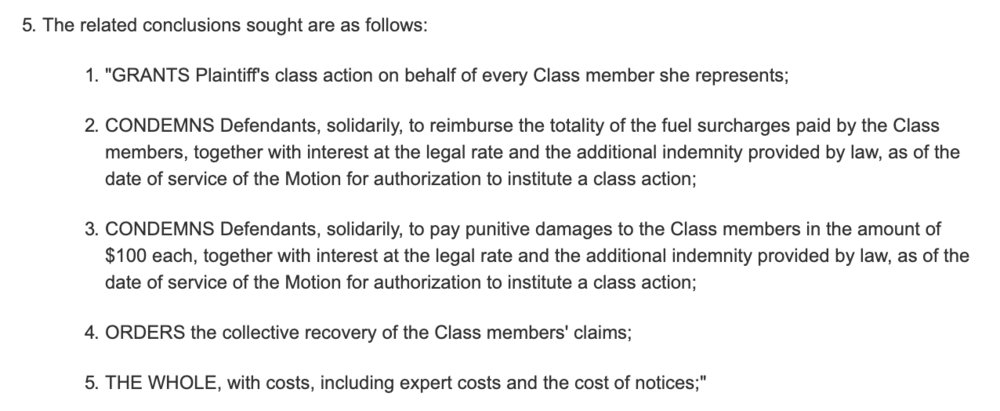
I’ve made no secret about my disdain for Aeroplan’s predatory practice of levying fuel surcharges on award tickets, so this is a development I very much welcome, as I think it’s about time that someone took Aeroplan to court over this.
At first, I was a little surprised that airport improvement fees and passenger service charges were coming under the line of fire as well, but upon considering the matter further, I don’t see why they should be any different from fuel surcharges.
You see, when you pay cash for a flight, your fare consists of the “base fare” set by the airline plus a host of additional taxes and fees. However, consumer regulations dictate that airlines and online travel agencies must display the “all-in” pricing during the booking process, which means that the exact composition of airfare never even registers for the majority of the travelling public.
On the other hand, when it comes to redeeming miles, anyone who’s touched the Aeroplan program knows that your miles are in fact only good for the base fare, with the additional taxes and fees (including the fuel surcharge, should the operating airline choose to pass it on) being paid out of your pocket at an additional expense.

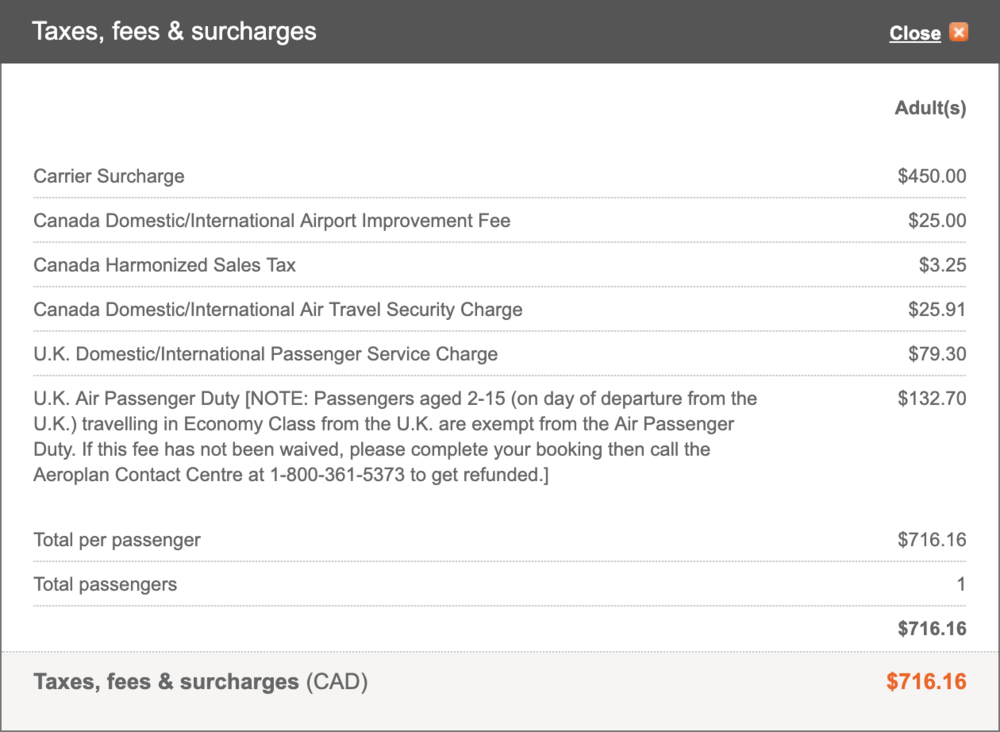
But why is it this way? Is there an actual reason for things to be as they are, or does Aeroplan pass on all these additional charges to its members simply because they can? This is the heart of the matter that the Quebec class action lawsuit addresses.
Someone needs to stand up to Aeroplan and challenge them to justify these practices, which is exactly what the class action is doing. Why shouldn’t our miles be enough to cover the litany of taxes and fees that come with a plane ticket? Is there a legitimate reason that’s fair to the consumer, or is it simply “because we make more money that way”?
Indeed, one thing I’m uncertain about is why the lawsuits don’t quite go the full distance. They cover fuel surcharges on domestic and transborder Air Canada flights, but not international flights, where the surcharges tend to be off the charts; moreover, partner redemptions on Aeroplan are excluded, even though I’d expect Aeroplan to treat Air Canada and Star Alliance partners similarly when deciding whether to absorb the surcharge versus passing it on.
Nevertheless, I’ll be very keen to see how these cases play out, as the result would go a long way towards setting a precedent in either side’s favour. If the practice of “unbundling” taxes and fees in mileage redemptions is indeed struck down by the Quebec courts, we could well be on our way towards a future free of fuel surcharges on award tickets. Imagine that, eh?
Conclusion
Class action lawsuits in Quebec are calling out Aeroplan for its anti-consumer practice of making members pay the additional fuel surcharges, airport improvement fees, and passenger charges when redeeming their miles, instead of absorbing these costs as part of the mileage program. Quebecers who qualify as part of the class action should be following this case closely, as they could be entitled to a full refund of the fees they paid in the past 7-8 years, plus punitive damages.
Quebec has some of the strongest consumer protection laws in Canada, so it’s no surprise that this battle is being waged in their courts, but I certainly hope that these movements gain traction nationwide as well. In fact, I’ll do my part to organize: all in favour of abolishing ancillary fees on loyalty redemptions in Canada, say aye in the comments 😉













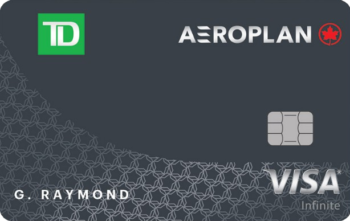






Wow There should be another class action for all the poor services , no staff to speak to and non-functioning booking system when people are paying so much money to adhere to this plan. The last few weeks have been terrible . See all Facebook comments on their page.
If I’m no longer a resident of QC but did book Aeroplan trips with YQ while I was there (2014-2017), am I still eligible?
I imagine you should be considered part of the class action, but there’s a chance you won’t be automatically enrolled if your Aeroplan account doesn’t currently show a Quebec address. Try reaching out to the law firm to confirm your eligibility and enrolment.
If there is merit to the case then Air Canada through Aimia would most likely want to settle out of court to avoid a very public court case. The key question is whether the Quebec Superior Court certifies the class action or denies it.
Even though this case is only being heard in Quebec for Quebec residents you can bet that many law firms who specialize in class actions will be monitoring the settlement.
Aye aye cap’n.
But seriously, could not say "aye" loud enough.
Aye aye aye
Aye????